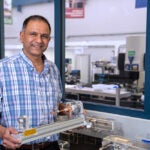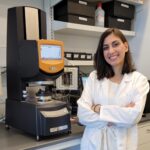Advanced materials and structures in extreme environments
Professor Arun Shukla’s team literally blows things up to learn how to better keep them together.
Using shock tubes, a 2,000-gallon underwater pressure tank and high-speed cameras capable of capturing thousands of frames per second, they can slow down time to study how materials will act under extreme temperatures, pH, heat transfer rates, and pressure.
Other engineers are exploring the effect that extreme environments have on carbon composite materials by studying them at the molecular level, as new materials are replacing steel and aluminum in applications such as aircraft and undersea robots. They are researching new composite materials, that are lighter and easier to maintain than traditional metals, but have a higher tolerance for damage.
 URI alum leads way in fusion energy breakthroughs - Jan. 27, 2026- Fusion energy is the pinnacle of clean energy and is in escalating demand as we face energy challenges of an increasingly internet-connected world with power-guzzling AI data centers popping up at an exponential rate. Fusion energy would provide abundant, carbon-free energy that essentially mimics the sun with no hazardous or radioactive waste. […]
URI alum leads way in fusion energy breakthroughs - Jan. 27, 2026- Fusion energy is the pinnacle of clean energy and is in escalating demand as we face energy challenges of an increasingly internet-connected world with power-guzzling AI data centers popping up at an exponential rate. Fusion energy would provide abundant, carbon-free energy that essentially mimics the sun with no hazardous or radioactive waste. […] Chemical engineering Ph.D. candidate to complete co-op, defend dissertation - Dec. 15, 2025 – Mechanical engineering, chemistry and physics may seem like three separate areas of study, but they overlap in more ways than one. Elnaz Nikoumanesh, a fifth-year Ph.D. chemical engineering candidate, knows that well. She studied mechanical engineering during her undergraduate and master’s studies, but became very interested in experimental work with biological […]
Chemical engineering Ph.D. candidate to complete co-op, defend dissertation - Dec. 15, 2025 – Mechanical engineering, chemistry and physics may seem like three separate areas of study, but they overlap in more ways than one. Elnaz Nikoumanesh, a fifth-year Ph.D. chemical engineering candidate, knows that well. She studied mechanical engineering during her undergraduate and master’s studies, but became very interested in experimental work with biological […]
 URI engineering professor honored by alma mater with Distinguished Alumnus Award - University of Rhode Island chemical engineering professor Arijit Bose has been selected as a 2025 Distinguished Alumnus Award recipient by his alma mater, Indian Institute of Technology, Kanpur, India. The honor is the highest award given to its alumni in recognition of their outstanding achievements. IIT Kanpur is one of the premier institutions established by […]
URI engineering professor honored by alma mater with Distinguished Alumnus Award - University of Rhode Island chemical engineering professor Arijit Bose has been selected as a 2025 Distinguished Alumnus Award recipient by his alma mater, Indian Institute of Technology, Kanpur, India. The honor is the highest award given to its alumni in recognition of their outstanding achievements. IIT Kanpur is one of the premier institutions established by […] URI’s Ashutosh Giri receives the Nation’s highest government award to outstanding scientists and engineers - KINGSTON, R.I. – Jan. 23, 2025 – Before the peaceful transition of power, the Biden administration recognized 400 scientists and engineers with the Presidential Early Career Award for Science and Engineering. Among the honorees were two University of Rhode Island faculty members: psychology assistant professor Justin Parent and mechanical, industrial, and systems engineering professor Ashutosh […]
URI’s Ashutosh Giri receives the Nation’s highest government award to outstanding scientists and engineers - KINGSTON, R.I. – Jan. 23, 2025 – Before the peaceful transition of power, the Biden administration recognized 400 scientists and engineers with the Presidential Early Career Award for Science and Engineering. Among the honorees were two University of Rhode Island faculty members: psychology assistant professor Justin Parent and mechanical, industrial, and systems engineering professor Ashutosh […]
Faculty
People are just now discovering all the benefits of these materials in terms of cost savings and their performance in extreme environments. Our research is helping to advance the field.
Arun Shukla
